Water Shortage: Our Role
WATER SHORTAGE: OUR ROLE (ISSUE 162) MARCH 17, 2015
By Diane Gold
WATER SHORTAGE
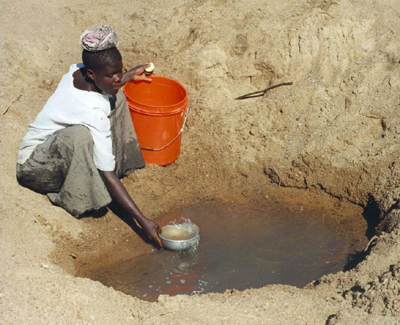 The reason I wrote this article was because I saw myself wasting water, even in the face of knowing that there is a water shortage. It really hit me when I had my own water shortage. I knew I was washing the dishes in my sink with the water running the entire time. I began to think that using a dishwasher, which my current residence lacks, might be more economical.
The reason I wrote this article was because I saw myself wasting water, even in the face of knowing that there is a water shortage. It really hit me when I had my own water shortage. I knew I was washing the dishes in my sink with the water running the entire time. I began to think that using a dishwasher, which my current residence lacks, might be more economical.
(According to the Water Resources section of whitehouse.gov [http://water.usgs.gov/edu/qa-home-percapita.html], my activity of washing for 3 minutes 2 times a day using a new faucet but an old sink uses about the same amount of water as one dishwasher load at 20 gallons per day. Too much.]
A CLOGGED SINK TEACHES COMPASSION
So, here’s what happened to my sink. It clogged. So, my water consumption came to a screeching halt. And I would have had to wait for a drain fixer until the following day if I had sat tight. That’s when I got a miniscule taste of feeling water shortage in the way that so many people do every day, and that is, not having water at my disposal when I wanted it.
True, I wasn’t really without water. I could Valley Girl myself into the bathroom and use water from the bathroom sink. But, I did not have my regular access, and the bathroom sink was too small for me to fill a pot with water. In my panic, I decided to go to the store and get some horrible chemicals to put down the sink that were guaranteed to fix the clog and pollute the Earth.
Although I felt sad at having to pour pollution into the pipe that would reach wherever it ended up, I did it anyway. It was guaranteed to work in 15 minutes, even though it took 12 hours.
The result was I was forever more cognizant of my water waste and continue to be so.
WHY IS THIS MY PROBLEM, OTHERS MIGHT ASK?
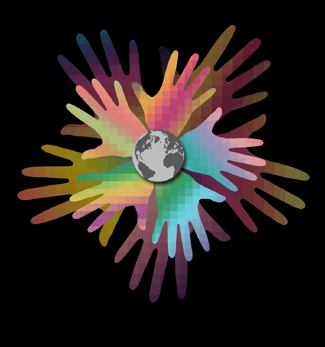 Some of us may not see there is a global water shortage. We don’t see 840,000,000 people in front of us every day who have no water. We say,
Some of us may not see there is a global water shortage. We don’t see 840,000,000 people in front of us every day who have no water. We say,
“What does this have to do with me? I have never been without water.
“I don’t use much water.
“There’s so much water from oceans that we can desalinate it if we have to.
“Only a few people in the centers of a few countries experience shortage.
“And what does this have to do specifically with my habits. They don’t have an effect water shortage.”
My response to those statements is clear, not because I am the most diligent person, but because we are not alone.
THE HUMAN FAMILY
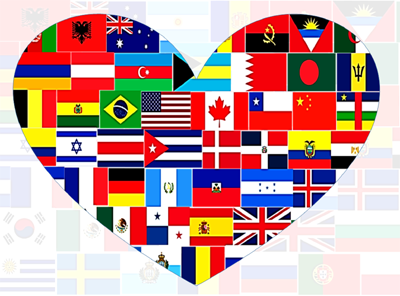 We forget quickly that we are part of one human family. If one part of our family is thirsty, then it is our responsibility to do something about it as if it were the people in our very house.
We forget quickly that we are part of one human family. If one part of our family is thirsty, then it is our responsibility to do something about it as if it were the people in our very house.
Remember the last hurricane, tornado, monsoon, tsunami that passed by?
People we never even spoke with before, who had lived in our village, on our street, right next door, up the avenue or field shared food, refrigeration, ice, concern, nurturing, and, yes, water. It was a magical transformation caused by our common environmental disaster.
Why are we so self-absorbed that we’re not like that every day? We all care about the people who are water insecure. Right?
FOOD CHOICE CAN WASTE WATER
Since life is so complicated, it is hard for us to think of water shortage unless it is right at our front door. It usually takes some heart wrenching photo of children’s misshapen bodies for our attention to be drawn to drought or lack of access to water. Imagine, though, that we are causing the continued water shortage by overuse. And how are we doing it?
According to the Water Footprint Network, 40 gallons of water are used to produce a pound of pulses (lentils, chickpeas, peas beans) compared to producing a pound of beef, which requires 45 times more water. So, our use of animals for food is one of our big wastes.
ACTION STEP
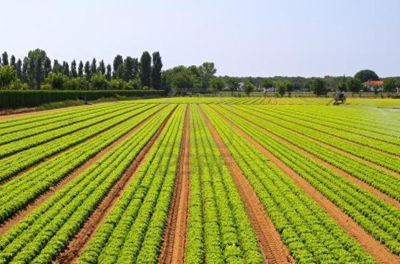 We could balance the water shortage by eating plants. That would allow everyone to have more water. According to everything I learned in my courses to become Certified in Plant-Based Nutrition, eating plants would prevent a bunch of chronic diseases and suffering; and it is not necessary to eat animal protein and most of us in the Western world are over-consuming protein.
We could balance the water shortage by eating plants. That would allow everyone to have more water. According to everything I learned in my courses to become Certified in Plant-Based Nutrition, eating plants would prevent a bunch of chronic diseases and suffering; and it is not necessary to eat animal protein and most of us in the Western world are over-consuming protein.
If we were eating plants, we could be teaching developing countries who are emulating us to grow plants efficiently, save their bodies and save the Earth. They would be spared learning the hard way that the amount of water it takes for raising animals and the disease statistics associated with eating meat, fish, poultry, dairy and the land we destroy are reason enough not to do it.
HOUSEHOLD CHOICES CAN WASTE WATER
Those of us who do not have to walk a mile to the water pump, and that’s most of us in the United States, take water for granted. We use water regularly for oral hygiene, in our toilets, for washing ourselves and cleaning our houses, to prepare food within our single family structure and to drink. Are we diligent, though? Yes, the amount we use in household is miniscule compared with the amounts used in agriculture. But, it still matters.
I mentioned earlier my personal waste. It turns out I was letting the water run the entire time I was brushing my teeth. For no reason other than that I liked the sound, I liked the feel of the water trickling on my toothbrush; but, mostly, because I forgot to turn it off, I was being wasteful and socially unacceptable. I also kept it running before and after filling my name brand electronic water flosser. Again, the amount of waste was not huge, but it was completely unnecessary. I’ve decided diligent water use matters.
By being diligent and turning the water off more often, I can maintain my 360 gallons or less a day for a single person in an apartment. I am taking responsibility for 15 minutes of watering the grass outside since I get to see it.
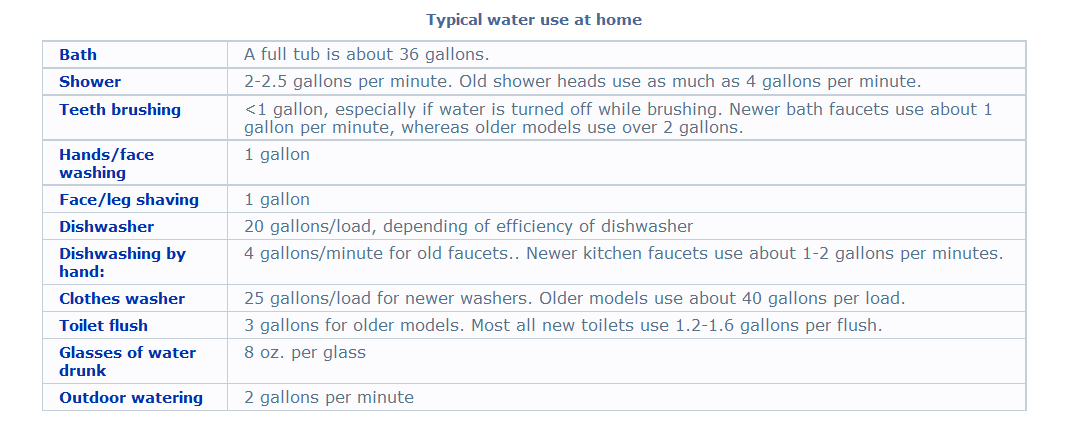
What the chart at the US Geological Surveys Water Science School does not take into account is the amount of water used to prepare our food. I am a plant-based eater, so I am using a smaller amount of water to grow my produce than someone who eats animal products. But, if I forgot about morality and ate 1 hamburger for the day, my water consumption would quadruple. Too much to be sustainable.
Plants require water to grow, but it is common knowledge they require less than animal based foods. I’ve seen statistics that animal-based food (including poultry, fish and dairy) use from 2.9 X more to 13 X more water, but I just know the number is considerably more.
CONCLUSION
I have read some surprising statistics about water, including, according to the Rural Community Assistance Partnership (from a document prior to April, 2009), that 1.7 million people in the United States live without plumbing facilities.
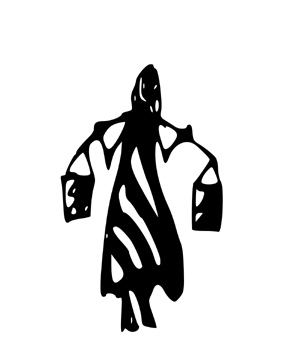 According to the April 29, 2011 article by Laurie Ure for CNN, nearly 1 billion people walk 3.5 miles a day to fill their jerry can to bring water home for the family. How often do those people get to their water source only to find a water shortage or a source that is dried up, closed, contaminated, unavailable? Something to think about.
According to the April 29, 2011 article by Laurie Ure for CNN, nearly 1 billion people walk 3.5 miles a day to fill their jerry can to bring water home for the family. How often do those people get to their water source only to find a water shortage or a source that is dried up, closed, contaminated, unavailable? Something to think about.
Let us be diligent to contribute positively to reduce water shortage by being connected to everyone in need, by considering our food choices and minimizing pollution, by composting and recycling, and, easiest of all, by reducing water waste that may be right in front of our eyes.
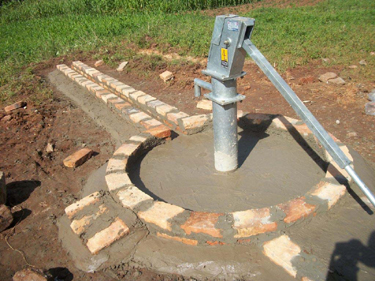 Although there is water shortage, there are areas worldwide that can access water with the right equipment. World Water Day, March 22 2015, celebrates water and our awareness that it is not forever. If you wish to donate to build a well so that 500-1000 people can have access to groundwater near their home in Africa for 10 years, please do it at: https://thewaterproject.org/community/profile/diane-gold.
Although there is water shortage, there are areas worldwide that can access water with the right equipment. World Water Day, March 22 2015, celebrates water and our awareness that it is not forever. If you wish to donate to build a well so that 500-1000 people can have access to groundwater near their home in Africa for 10 years, please do it at: https://thewaterproject.org/community/profile/diane-gold.
![]()
If you wish to share your story, please hit reply in your email program to be contacted.
If you need habit help, go to warriorsofweight-consulting.
![]()
FEEDBACK
We value your feedback very much.
Please leave a comment below.
Please LIKE us on the website and at
WarriorsOfWeight on Facebook.
You can also follow us on Twitter @warriorsoweight.
Thanks.
![]()
DIANE GOLD, PUBLISHER AND AUTHOR
Diane Gold, Founder of Warriors of Weight, Turning Habits Into Health, is a mentor in tai chi, kung fu and meditation, a music, fitness and stress expert, dedicated mom, studying peaceful conflict resolution, habit replacement and certified in plant-based nutrition.
She cares about water. She says,
“I’m grateful for my sink’s having clogged. It gave me a great look at conservation of water in the kitchen. I’m grateful for noticing my toothbrush water, so I can reduce it.
“These are tiny things which, alone, amount to little, but, together, would be more meaningful. Let’s take a moment and consider that water is not renewing as quickly as we are using it. So, let’s use less. And let’s appreciate what we have more.
“Finally, let us all take good care of ourselves because we are so worth it!”
![]()







